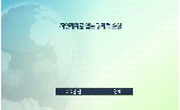Water supply is continuously suffering from frequent droughts under climate change, and such extreme events are expected to become more frequent due to climate change. In this study, the decision scaling method was introduced to evaluate the drought v...
http://chineseinput.net/에서 pinyin(병음)방식으로 중국어를 변환할 수 있습니다.
변환된 중국어를 복사하여 사용하시면 됩니다.
- 中文 을 입력하시려면 zhongwen을 입력하시고 space를누르시면됩니다.
- 北京 을 입력하시려면 beijing을 입력하시고 space를 누르시면 됩니다.

Decision Scaling 기반 댐 운영 기후변화 가뭄 취약성 평가 = Development of a decision scaling framework for drought vulnerability assessment of dam operation under climate change
한글로보기https://www.riss.kr/link?id=A108564998
- 저자
- 발행기관
- 학술지명
- 권호사항
-
발행연도
2023
-
작성언어
Korean
- 주제어
-
등재정보
KCI등재
-
자료형태
학술저널
-
수록면
273-284(12쪽)
- 제공처
- 소장기관
-
0
상세조회 -
0
다운로드
부가정보
다국어 초록 (Multilingual Abstract)
Water supply is continuously suffering from frequent droughts under climate change, and such extreme events are expected to become more frequent due to climate change. In this study, the decision scaling method was introduced to evaluate the drought vulnerability under future climate change in a wider range. As a result, the water supply reliability of the Boryeong Dam ranged from 95.80% to 98.13% to the condition of the aqueduct which was constructed at the Boryeong Dam. Furthermore, the Boryeong Dam was discovered to be vulnerable under climate change scenarios. Hence, genetic algorithm-based hedging rules were developed to evaluate the reduction effect of drought vulnerability. Moreover, three demand scenarios (high, standard, and low demand) were also considered to reflect the future socio-economic change in the Boryeong Dam. By analyzing quantitative reliability and the probability of extreme drought occurrence under 5% of the water storage rate, all hedging rules demonstrated that they were superior in preparing for extreme drought under low-demand scenarios.
국문 초록 (Abstract)
최근 지속적인 가뭄으로 물 공급에 큰 어려움을 겪고 있으며, 이러한 극한 사상의 발생은 기후변화에 따라 더욱 빈번해질 것으로 전망된다. 본 연구는 기후변화에 따른 댐 운영 가뭄 취약성...
최근 지속적인 가뭄으로 물 공급에 큰 어려움을 겪고 있으며, 이러한 극한 사상의 발생은 기후변화에 따라 더욱 빈번해질 것으로 전망된다. 본 연구는 기후변화에 따른 댐 운영 가뭄 취약성을 평가하고자, 보다 넓은 범위에서 미래 기후변화의 변동성을 반영할 수 있는 decision scaling 기법을 제안하였다. 충청남도 보령댐을 시범유역으로 선정하고 양적 신뢰도를 이용하여 평가한 결과, 보령댐의 가뭄 취약도는 도수로 반영 여부에 따라 95.80%에서 98.13%까지 변동하였고, 기후변화에 매우 취약한 것으로 나타났다. 더불어 유전 알고리즘 기반 최적의 헤징룰을 산정하여 가뭄 취약성의 저감 효과를 분석하였고, 다양한 사회·경제적 변화에 대응하기 위해 세 가지 수요 시나리오(고수요, 저수요, 기준수요) 하에서 평가를 진행하였다. 양적 신뢰도와 극한가뭄 발생 빈도를 평가 기준으로 분석한 결과, 두 헤징룰은 K-water의 용수공급 조정기준 대비 저수요 시나리오에서 공급 안정도를 개선시킴으로써 극한가뭄에 적절히 대처할 수 있는 방법으로 사용될 수 있을 것이다.
동일학술지(권/호) 다른 논문
-
드론기반 시공간 초분광영상을 활용한 식생유무에 따른 하천 수심산정 기법 적용성 검토
- 한국수자원학회
- 권영화
- 2023
- KCI등재
-
농업용 저수지 CCTV 영상자료 기반 수위 인식 모델 적용성 검토
- 한국수자원학회
- 권순호
- 2023
- KCI등재
-
- 한국수자원학회
- 이승민
- 2023
- KCI등재
-
FAO Penman-Monteith 기준증발산식 민감도 분석
- 한국수자원학회
- 임창수
- 2023
- KCI등재




 ScienceON
ScienceON






